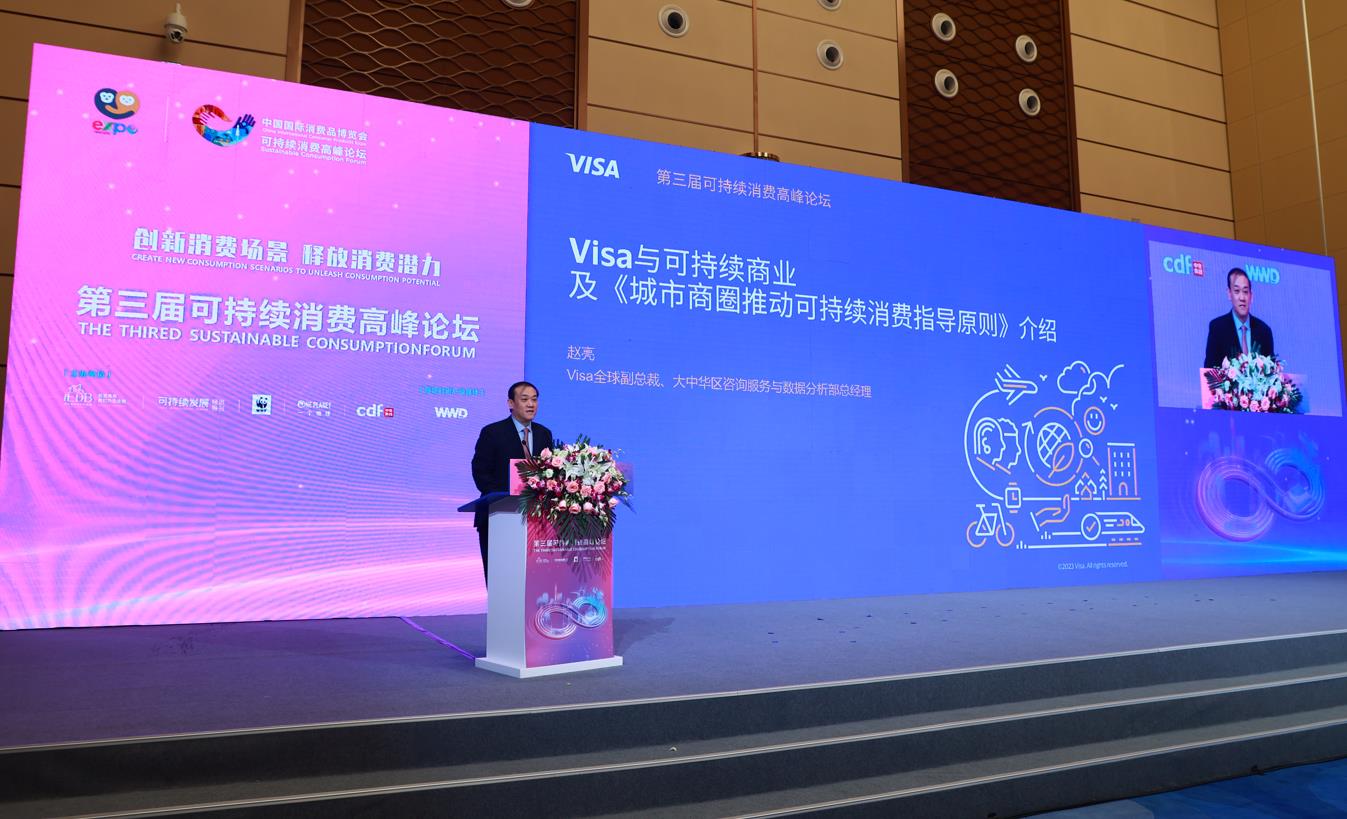
On April 12, 2023, the China Sustainability Tribune and Visa officially released the Guiding Principles for Promoting Sustainable Consumption in Urban Business Districts (hereinafter referred to as the "Guiding Principles") at the 3rd Sustainable Consumption Forum of the 3rd China International Consumer Products Expo (CICPE), which is the first guiding document in China on promoting sustainable transformation of consumption in urban business districts. The Guiding Principles will provide guidance or action directions for regional business systems, relevant government departments, urban complex operators, and various merchants to promote the transformation of the consumption towards sustainable development, and help build a sustainable and dynamic consumption ecosystem. This research report is one of the important achievements of the Global Sustainable Consumption Initiative for the year 2022-2023.
Visa, one of the publishers for this report, is also one of the first member companies of the Global Sustainable Consumption Initiative. Zhao Liang, Global Vice President of Visa and General Manager of Consulting Services and Data Analysis in Greater China, stated in a speech at the 3rd Sustainable Consumption Forum that sustainable consumption has become a global trend. He said, "Research shows that consumers in the Asia Pacific region will contribute to half of global consumption growth in the next decade, bringing a consumption growth of USD 10 trillion. Consumers are more concerned about sustainable development issues than before and looking for ways to integrate sustainable behaviors and habits into daily life. Companies that can seize the sustainable consumption boom in the Asia Pacific region will gain a competitive advantage in the market."
Yu Zhihong, President and Editor-in-Chief of China Sustainability Tribune, addressed that currently, consumption plays a leading role in China's healthy and stable economic development, industrial structure transformation, and improvement of people's well-being, which is increasingly prominent. As an important carrier of urban consumption, urban business districts have gradually become an important engine for promoting consumption upgrading and urban development, as well as an important channel to meet people's needs for a better life. Under the trend of sustainable development, integrating sustainable consumption into the building and renewal of urban business districts is not only an inevitable requirement for ecological civilization and high-quality development, but also a positive response to new demands for green consumption or sustainable consumption. It will promote the upgrading of urban consumption and sustainable socio-economic development, and help create more competitive urban business districts in the future that will drive the new consumption in China.

Although consumption decision-making is usually considered a personal behavior, it is influenced by external factors such as the supply system, shopping environment, and social norms. These factors that determine whether sustainable consumption awareness can be transformed into action are the fundamental underpinning for sustainable consumption to be implemented in the reality. Therefore, based on the analysis framework of "attitude-facilitator-infrastructure" (AFI), the Guiding Principles proposes that business districts should take actions to support sustainable transformation of consumption in the supply system (i.e. infrastructure, goods and service supply that support consumption), facilitative mechanisms, and consumption attitudes, as indicated below.
First, enhancing the sustainability of the consumption support system, including promoting sustainable changes in the physical infrastructure (e.g. commercial facilities and transportation facilities) and consumption supply system (e.g. goods and service supply) of urban business districts, in order to lay a solid foundation for sustainable consumption. To be specific, first, infrastructure that is conducive to promoting sustainable lifestyles should be built, including business district location planning, building design and operation, transportation facility planning and construction, and public facility design; second, the supply capacity of sustainable goods and services should be enhanced, such as innovating business formats or business models, providing sustainable products and services, and incubating local enterprises.
Second, improving the mechanism for promoting sustainable consumption. Institutional arrangements, market tools, and other mechanisms that provide incentives or constraints for sustainable choices can be utilized to shape sustainable consumption concepts and models into a set of behavioral norms. Particularly, first, a sustainable development governance model should be established for business districts; second, sustainable operation and consumption should be guided and encouraged, making sustainable consumption more "beneficial", more "popular", more "transparent", and "easier"; and third, falsely labeling green and low-carbon products should be cracked down on.
Third, raising awareness of the sustainable consumption, namely, transmitting knowledge and concepts to stakeholders involved in the construction of business districts, so that they can understand sustainable consumption and the necessity of systematically promoting sustainable development. Specifically, first, an enabling environment should be created for sustainable consumption to encourage people to be more mindful of consumptive choices; second, experience should be promoted to advance sustainable transformation of consumption, for instance, strengthening knowledge sharing and capacity building related to sustainable consumption, and carrying out experience exchange on sustainable development in business districts.
The Guiding Principles has specifically selected excellent enterprise cases in retail, catering, leisure and entertainment, as well as hospitality industry to promote sustainable consumption, in order to better guide and inspire the sustainable transformation of major business formats in urban business districts. It is expected to provide more reference for relevant enterprises and drive more enterprises to join the trend of sustainable consumption transformation.
Although significant progress has been made in promoting sustainable consumption domestically, there is still a huge gap that needs to be bridged between "knowing" and "practicing". The Guiding Principles proposes directional suggestions for future work.
1. The prosperity of cities and business districts should be redefined.
2. Efforts should be made to incorporate the implementation of sustainable consumption into the evaluation system of urban business district development or the evaluation system of consumption center cities.
3. Urban business districts should continue to strengthen their ability to explore and understand new consumer demands for sustainable products and services, and continuously improve relevant sustainable supply.
4. "Guiding factors" should be leveraged to promote changes in public behavior. In the future, urban business districts should gradually innovate and improve sustainable consumption incentive mechanisms, increase consumers' motivation for sustainable consumption by leveraging market means or social influencing factors, and further advocate consumer behavior changes by designing selection systems.
Scan the QR code below to download the electronic version of the Guiding Principles for Promoting Sustainable Consumption in Urban Business Districts.

Source: China Sustainability Tribune




 Back
to top
Back
to top